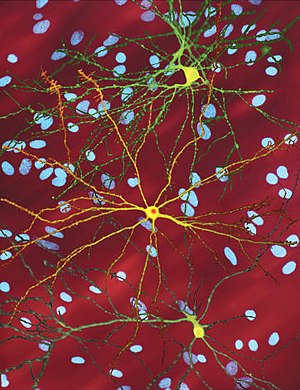Huntington's disease
| Huntington's disease (HD) | |
|---|---|
| Synonyms | Huntington's chorea |
 |
|
| An edited microscopic image of medium spiny neurons (yellow) with nuclear inclusions (orange), which occur as part of the disease process, image width 360 µm | |
| Classification and external resources | |
| Specialty | neurology |
| ICD-10 | G10, F02.2 |
| ICD-9-CM | 333.4, 294.1 |
| OMIM | 143100 |
| DiseasesDB | 6060 |
| MedlinePlus | 000770 |
| eMedicine | article/1150165 article/792600 article/289706 |
| Patient UK | Huntington's disease |
| MeSH | D006816 |
| GeneReviews | |
| Orphanet | 399 |
Huntington's disease (HD), also known as Huntington's chorea, is an inherited disorder that results in death of brain cells. The earliest symptoms are often subtle problems with mood or mental abilities. A general lack of coordination and an unsteady gait often follow. As the disease advances, uncoordinated, jerky body movements become more apparent. Physical abilities gradually worsen until coordinated movement becomes difficult and the person is unable to talk. Mental abilities generally decline into dementia. The specific symptoms vary somewhat between people. Symptoms usually begin between 30 and 50 years of age, but can start at any age. The disease may develop earlier in life in each successive generation. About 8% of cases start before the age of 20 years and typically present with symptoms more similar to Parkinson's disease. People with HD often underestimate the degree of their problems.
HD is typically inherited from a person's parents, with 10% of cases due to a new mutation. The disease is caused by an autosomal dominant mutation in either of an individual's two copies of a gene called Huntingtin. This means a child of an affected person typically has a 50% chance of inheriting the disease. The Huntingtin gene provides the genetic information for a protein that is also called "huntingtin". Expansion of CAG (cytosine-adenine-guanine) triplet repeats in the gene coding for the Huntingtin protein results in an abnormal protein, which gradually damages cells in the brain, through mechanisms that are not fully understood. Diagnosis is by genetic testing, which can occur at any point in time, regardless of whether or not symptoms are present. This fact raises several ethical debates: the age at which an individual is considered mature enough to choose testing; whether parents have the right to have their children tested; and managing confidentiality and disclosure of test results.
...
Wikipedia
